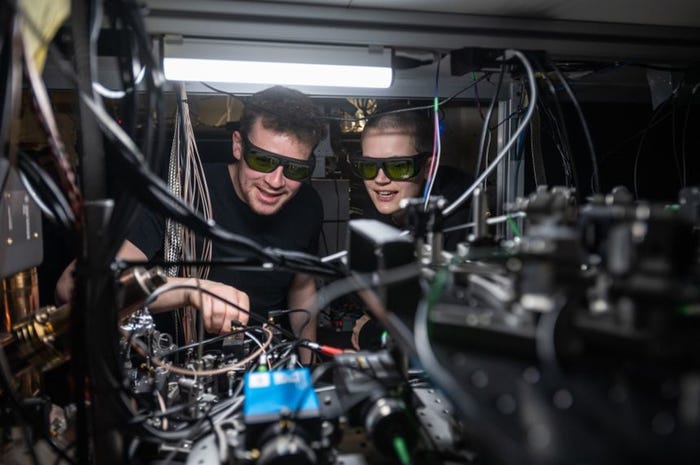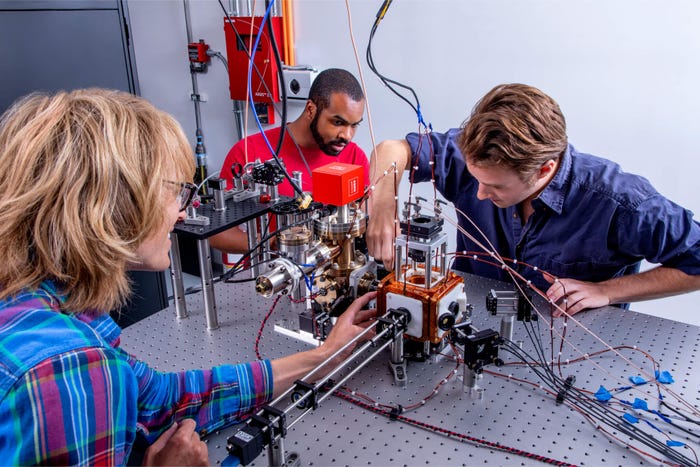
Connects decision-makers and solutions creators to what's next in quantum computing
5 Ways Quantum Will Transform Everyday Life5 Ways Quantum Will Transform Everyday Life
Quantum computing offers a path to navigating modern challenges with greater certainty

Our world is gripped by uncertainty. From economic volatility to the climate crisis, businesses and individuals alike are navigating a landscape marred by unpredictability. As the World Economic Forum warns in its most recent global risk report, our outdated digital infrastructure and subsequent services are struggling to keep pace with the growing demands of the modern world.
As emerging technologies like AI, blockchain and even 5G hit everyday life like a tidal wave, we need something that can not only help us navigate our way but also handle the waves. Think of it like trying to cross an ocean on a rowboat, without a compass. What we need is a modern cruise ship.
Thankfully, that cruise ship is ready to set sail in the form of quantum computing, an emerging technology that will revolutionise the world. It promises not just faster calculations but also offers a way of unlocking solutions to problems we’ve long considered unsolvable. From the way we live and work to the way we protect our planet, quantum is poised to transform every aspect of our lives. Quantum computing will provide the certainty businesses and societies crave.
Let’s explore how it will reshape our world.
Quantum Breakthroughs for a Healthier Tomorrow
A critical part of everyday life is healthcare. It’s an industry that faces immense challenges, particularly when it comes to those living with rare diseases. In short, there are over 7,000 rare diseases with around 95% of these lacking an effective treatment. Moreover, an estimated 3.5 million people in the U.K. live with a rare disease.
With thousands of rare diseases and limited research funding, finding effective treatments is a huge undertaking. Patients and their families face a constant battle against uncertainty. This is where quantum computing can make a difference. By using a new algorithm called Quantum Extremal Learning, researchers can more efficiently simulate and optimise molecular structures beyond the reach of classical computers to find the most promising drug candidates.
The algorithm combines quantum and classical computing techniques, using the power of both to solve complex problems and handle large datasets. This can lead to the development of faster and more cost-effective treatments, particularly for rare diseases. Moreover, it unlocks the potential for creating new treatments for rare diseases previously thought impossible, whether from a lack of investment or due to scientific complexities. It can – and will – have a profound impact on the lives of millions.
A Quantum Leap in Weather Predictions
It’s no secret the weather also has a big impact on our lives and it’s human nature to talk about it. This year has given us plenty to talk about. So far, 2024 is shaping up to be the warmest year globally on record, with extreme weather now becoming the “new normal.”
Climate change and rising temperatures are causing knock-on effects that we’re only just beginning to understand, with unpredictable weather patterns disrupting everything from businesses' bottom lines to supply chains and even what we eat. Therefore, accurate forecasts are essential. Quantum computing offers great potential for the near future with its ability to process vast datasets at unprecedented speeds.
Traditional computers struggle to handle the enormous amounts of data needed to model complex weather systems, with variables like temperature, humidity, air pressure and ocean currents, all interacting in intricate ways. Yet, quantum computers can. Farmers, for example, rely on accurate forecasts to make decisions about when to plant and harvest crops. With better and earlier predictive models soon to be powered by quantum computing, they will be able to respond more effectively to weather patterns.
Supercharging and Improving AI
Quantum’s potential extends further than just predicting the weather. It’s set to revolutionise other technologies. And while AI has become deeply embedded in our daily lives, its computational demands are growing exponentially.
In just three years from now, AI servers could be consuming as much energy as Sweden does. The energy-intensive process of training large language models and other AI systems requires massive amounts of computational power. Indeed, most computers today only run at peak output for a small fraction of the time, with those providing cloud-based internet services operating at full blast less than half the time.
Quantum computers, even at their most advanced, consume a fraction of the energy used by today’s supercomputers, running at higher and more consistent output levels. For example, cold atom quantum machines use just a few kilowatts compared to the megawatts required by conventional computers found in data centres.
This energy efficiency means quantum computing could drastically reduce the carbon footprint of AI and other computational tasks. When combined with AI, it can optimise processes like energy grid management and resource allocation, allowing AI to perform its tasks more efficiently and with a smaller environmental impact.
A Greener Planet With Quantum Power
As the world grapples with those increasing energy demands, quantum computing also offers certainty in combating climate change. Data centres, responsible for handling the vast computational needs of AI and other technologies, have become major contributors to global carbon emissions. In fact, from 2020 to 2022 the real emissions from the “in-house” or company-owned data centres of Google, Microsoft, Meta and Apple are likely about 662% – or 7.62 times – higher than officially reported.
Quantum computing can, however, accelerate the development of cleaner technologies, such as better batteries and more efficient solar cells as well as more energy-efficient hybrid computers. By simulating molecular structures at unprecedented levels of detail, quantum computers could identify substances that store energy more effectively or convert it more efficiently, leading to technological breakthroughs. By reducing energy consumption and improving efficiency, quantum computing will bring us closer to the certainty we need in developing sustainable solutions to fight climate change.
Everyday Products, Just Better
Materials science is the study of how the structure of materials influences their properties. From the steel in our skyscrapers to the silicon in our smartphones, materials underpin our modern world. Quantum computing has the potential to significantly accelerate computational tasks in materials science and could transform our everyday lives.
At the atomic level, quantum computers can simulate the properties of materials far more accurately than classical systems, discovering entirely new compounds with desired traits like greater strength, lighter weight or improved conductivity – key improvements for industries like aerospace and automotive manufacturing.
For example, quantum computers can model atomic interactions in materials like iron and manganese oxide to study properties like magnetism, a crucial component within electrical and electronic engineering. These simulations reveal insights into how atoms would align to form materials with desired magnetic properties, leading to new and improved materials suitable for computing hardware and superconductors.
Charting a Quantum Course
The quantum revolution is upon us. It’s a voyage into a new frontier where uncertainty yields to possibility. By harnessing the power of quantum computing, we can navigate the complexities of the 21st century with increased certainty and precision.
For businesses and society, this certainty means unlocking solutions to some of the most pressing challenges of our time that traditional methods just can’t achieve. No business wants to be on the back foot of the next revolution. It’s time to set sail on this quantum journey, as we navigate the waves of change. Hop aboard, as this is one ship you won’t want to miss.
About the Author
You May Also Like






